When I Turn Off My Brain: An Interview w/ Christian TeBordo
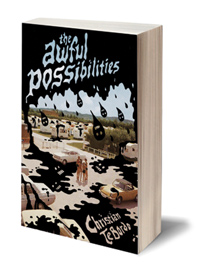 In the summer of last year, Featherproof released The Awful Possibilities, the fourth book by Philadelphia’s Christian TeBordo. It is an assemblage of extreme range in sound and direction, as TeBordo’s work manages to funnel a kind of well-orchestrated, rising mania across a range of perspectives and situations, including teenage suburban thug rappers planning a school shooting, a logic-fucked woman involved in shady black market business in a hotel, a dude trying to buy a new wallet, deathbed advice minds, and several other hybrid enactments than in other hands would lack the flair of TeBordo’s ability to funnel livelanguage and feeling into seemingly any kind of body. As says George Saunders: “Christian TeBordo shows that it is possible to be, simultaneously, a wise old soul and a crazed young terror.”
In the summer of last year, Featherproof released The Awful Possibilities, the fourth book by Philadelphia’s Christian TeBordo. It is an assemblage of extreme range in sound and direction, as TeBordo’s work manages to funnel a kind of well-orchestrated, rising mania across a range of perspectives and situations, including teenage suburban thug rappers planning a school shooting, a logic-fucked woman involved in shady black market business in a hotel, a dude trying to buy a new wallet, deathbed advice minds, and several other hybrid enactments than in other hands would lack the flair of TeBordo’s ability to funnel livelanguage and feeling into seemingly any kind of body. As says George Saunders: “Christian TeBordo shows that it is possible to be, simultaneously, a wise old soul and a crazed young terror.”
Last month, Christian and I took some time emailing about the book, Christian’s experience of influence by Brian Evenson and others, the process of assembling a text, getting along in sound and structure, approach, revision, and nudie pics.
* * *
BB: The Awful Possibilities is your first collection of short fiction after having published three novels. Do you see yourself more as a novelist, and is there a difference in your approach? Were these stories written over a long period of time?
CT: Let me answer these backwards, because that way it goes from easy to really hard. The stories in The Awful Possibilities were written over a little more than 10 years. One of the stories in there is the first I ever made that I considered a story. The most recent (the postcards), I sent to featherproof after they’d accepted the manuscript. Actually just before the book got laid out. I wrote and published my three novels during the same time. I don’t approach the forms differently when I sit down to write. For me it’s just the sentences and the persona that generates the sentences telling the larger work where to go. On the other hand, I try to do something different each time. People who read my last novel might recognize a sensibility or tendencies in The Awful Possibilities, but I hope nobody would be able to predict what one would be like having read only the other. The question of how I see myself is a little tougher. As a writer, I’m happy doing both. Stories are fun because sometimes you can just bulldoze through a draft in a sitting or two. Or you can spend weeks being really meticulous and crafty with a few paragraphs without getting disgusted by what you’re up to. Novels are fun because you have some sense of what you’re going back to each night and there’s more room to surprise yourself. The truth is, though, I feel more comfortable with short stories because I do want to be read, but I want my stuff to be an all-out assault, too, for now at least. I think people are more willing to put up with that for 10 pages than 200.
January 4th, 2011 / 2:13 pm
All you sentence-heads, Snooki’s on the sentence tip too: “Any juicehead will get some nut shrinkage. And bacne. They fly into a ‘roid rage, it is a ‘road’ ‘roid rage.” I mean, sound is sound: Knopf by way of the club. I’ve read worse; hell, frequently.
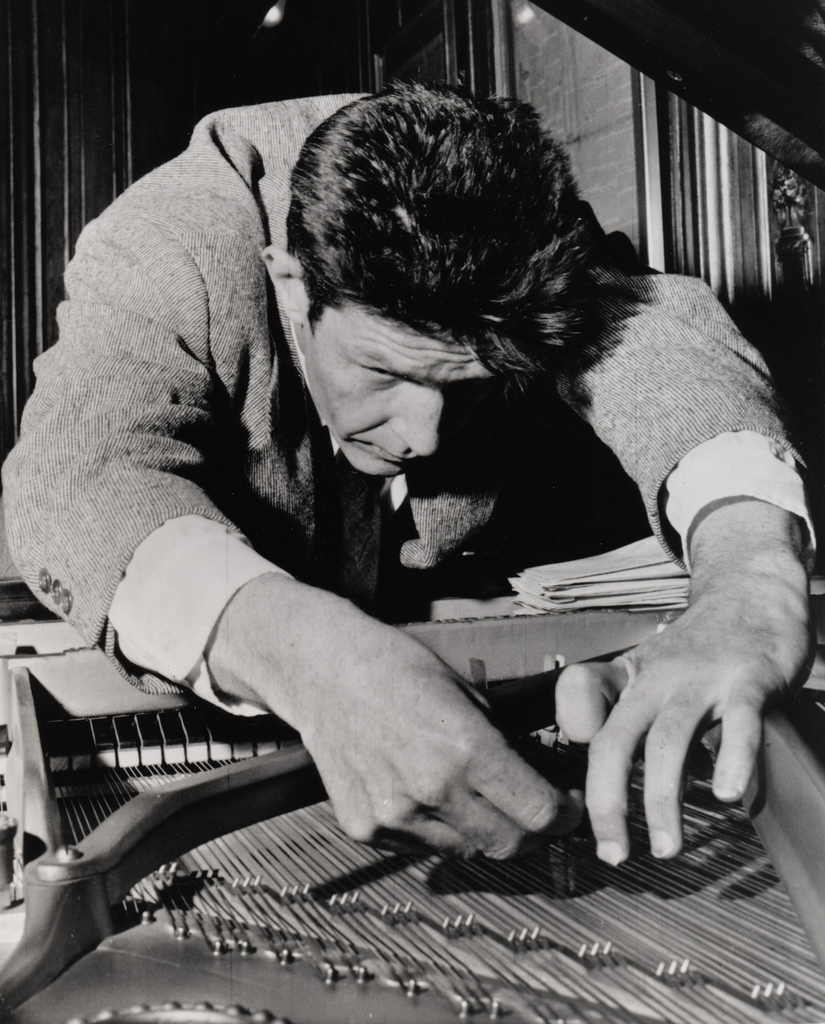
“If something is boring after two minutes, try it for four. If still boring, then eight. Then sixteen. Then thirty-two. Eventually one discovers that it is not boring at all.” – John Cage
What do you expect to pay for a paperback book? What if it’s 700+ pages? Books are really cheap entertainment. Do you think they should cost more?
Gossip until it’s not, but anyway: James Franco to write/adapt & direct As I Lay Dying and Blood Meridian.
Misremembering the ending
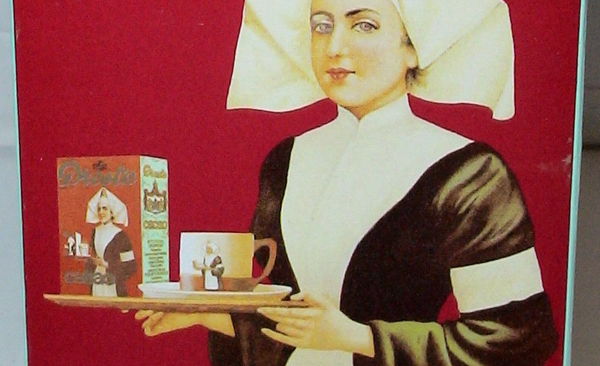
A childhood trauma:
I am five or six and I am watching the animated version of Russell Hoban’s The Mouse and His Child. At the end of this film, the mouse—a windup toy—and his child—same—find themselves at the bottom of a lake, and find themselves staring at a can of dog food. On the can of dog food is a recursive image: a dog standing next to a can of dog food with a label that features that dog standing next to a can of dog food with a label that features…
The toy mice are stuck at the bottom of the lake, peering into the label, the child tasked with counting the number of dogs. And so the child does forever and ever and ever, and the film ends, and I am sent to bed, and I spend the subsequent decades sometimes pondering the concept of eternity until I am filled with anxiety and my neck begins to sweat. One dog, two dogs, three dogs, four…
After the cut is the animated version of The Mouse and His Child. Skip ahead 50 or so minutes to watch the scene in question.
READ MORE >
The Rolls Should Be Warm: An Interview w/ Michael Earl Craig
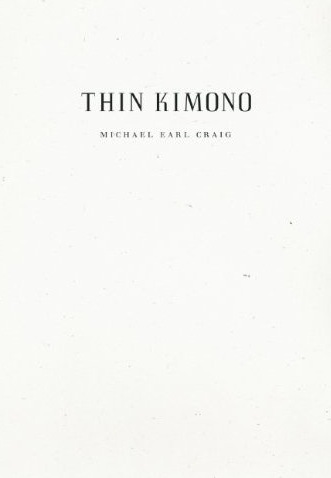 Michael Earl Craig’s third book, Thin Kimono, was recently published by Wave Books. He is one of my favorite poets. I asked him some questions when he was traveling in Michigan, but normally he is in Montana. -ZS
Michael Earl Craig’s third book, Thin Kimono, was recently published by Wave Books. He is one of my favorite poets. I asked him some questions when he was traveling in Michigan, but normally he is in Montana. -ZS
ZS: What brings you to Michigan? And what do you think about Michigan’s fudge?
MEC: The Michigan trip is for my parents’ 50th wedding anniversary. We’re in Leland, Michigan. In addition to my parents, my brother and his wife and their daughter are here, as well as my sister, her husband, and their three kids. Susan and I brought our Chia Pet, Nancy. When we were kids we’d vacation for a week (sometimes two) in this part of Michigan, so we have a lot of family history here.
And the fudge is big time in Michigan. My favorite is Murdick’s Fudge—the store in Traverse City, specifically. There are a few other Murdick’s stores but the Traverse City one is the best. I normally don’t eat fudge. Fudge is usually gritty and makes me want to knock my front teeth out on a banister. But this fudge is different. It’s creamy. It melts in your mouth (or wherever you put it). My favorite flavor is Black Cherry. Also Vanilla Chocolate Chip. And the Maple is very good. And the Chocolate/Peanut Butter. I know I sound like some sort of candy hillbilly here but it’s all true. When you eat this fudge it changes you.
ZS: What else do you eat that changes you?
MEC: Fudge is the only thing.
January 3rd, 2011 / 1:59 pm
All the books I read in 2011: go to your local independent bookseller—if such a thing exists in your town—and reserve a copy of Patrick deWitt’s dark, deep, and deadly funny upcoming novel The Sisters Brothers. It’s a western. It’s spare and has existential undercurrents. The narrator is a husky-bodied, quiet-talking killer. It’ll be out in May.
Madras Press: New Ben Marcus, Kalfus, Kaufman, Barthelme
Madras Press has announced the release of four new titles, each in short run, short sized book copies, sold with all proceeds going to the charity of the author’s choice.
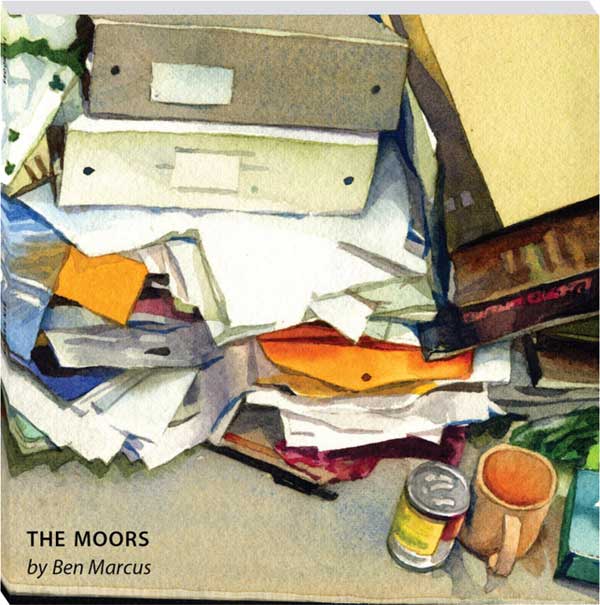
Among these is the first new standalone work by Ben Marcus in a long while, a 72 page book called The Moors:
The Moors is the story of a man, Thomas, whose understanding of reality leaves him at the prospect of encountering an attractive colleague while refilling his coffee at work; more so of the contents of his mind over the course of those feet from his desk, and the ensuing minutes. Along the way, shadows loom and bend, backs are turned, walls seem to move, and the passage of time is marked by the sounds of living objects colliding just beyond the sight of those who are listening. A breathtaking and claustrophilic story by Ben Marcus, written at a terrifyingly close point of view.
Also available is A Manual for Sons, an excerpt from Donald Barthelme’s The Dead Father; a volume of three new stories by Ken Kalfus; and The Tiny Wife by Andrew Kaufman. I have the first series of releases from Madras and they are beautiful little objects, and each toward a great cause.
